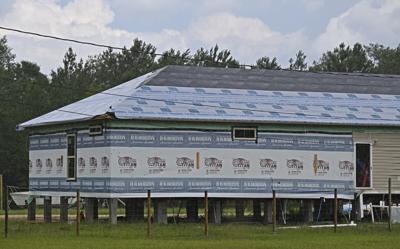When Youngsville couple Alicia and Wes Dixon were in the process of purchasing their first house from national homebuilder D.R. Horton in 2014, they signed a sales contract that included an arbitration clause.
The Dixons’ attorneys insist the arbitration clause in the contract is invalid because D.R. Horton sales reps coaxed the couple into signing it under false pretenses.
Their lawsuit alleges executives at the Texas-based construction company knew when they sold the home that it wasn’t built up to snuff for Louisiana’s humidity and had a defective ventilation system that caused mold and leakage issues.
The Dixons accuse D.R. Horton, the nation’s leading homebuilder, of constructing scores of homes along the Interstate 10 corridor between Lake Charles and Slidell that aren’t properly built to withstand Louisiana’s blistering summer heat.
The legal battle has played out in state and federal courts over the past three years. Attorneys for D.R. Horton contend the arbitration clause was a binding agreement that stipulated any legal disputes that arose would be settled in arbitration.
The lawsuit survived a recent challenge from the company, whose attorneys sought to get the case thrown out of court last month for lack of substantive evidence to back the plaintiffs’ allegations.
“Just because they say stuff is so does not make it so,” James Alcee Brown, D.R. Horton’s lead attorney against the Dixons, said during a March 24 hearing. “What they’re trying to do, quite honestly, is try to keep proceedings going in this court indefinitely so that the court won’t rule on our arbitration issues. We don’t think that’s right.”
Lance Unglesby, the plaintiffs' New Orleans attorney, argued that D.R. Horton’s sales agents told the Dixons the agreement they signed was just a form contract dealing with a deposit they made on the home they purchased. It never appeared in the closing documents, and staff never used the word “arbitration” when explaining the documents to potential buyers, he told a judge. That nullified the arbitration agreement because the Dixons were induced to sign as part of an elaborate fraud scheme the company orchestrated, Unglesby argued
“The Dixons never agreed to arbitration. The Dixons never agreed to delegation,” he said. “The Dixons were told they were doing something else, and it was not. They were lied to. It was misstated and mischaracterized.”
District Judge Donald Johnson, who is presiding over the case, denied the dismissal motion after listening to more than two hours of arguments from both sides. He determined it was too premature at this juncture to decide what defines a contract under the standards of Louisiana’s civil law.
'They are wrong'
Last week’s hearing came nearly a year after Johnson appointed retired Orleans Parish chief judge Carolyn Gill-Jefferson to be a special magistrate, overseeing discovery in the case.
Brown, D.R. Horton’s lawyer, said the company has turned over more than 155,000 documents of emails, sales and training memos, and internal staff reports over an eight-year period. With all that, he said the plaintiffs have yet to reveal any evidence of fraud. He objected to a motion to amend their petition.
The Dixons initially named Bell Mechanical, a Baton Rouge HVAC company, as a defendant in the lawsuit, alleging their subcontractors installed the faulty ventilation system at the Dixons' and other buyers’ homes. Disclosures made in the discovery phase revealed it was Xcel Air Conditioning Services Inc., a Baton Rouge subcontractor, that installed the HVAC system in the Dixons’ house.
Johnson granted a motion to add Xcel Air as a defendant. Horton’s lawyers objected to the amendment and pointed to it as a sign that all of the plaintiffs’ allegations are unsubstantiated. Brown accused their attorneys of “saying stuff that just ain’t so."
“Their lawsuit has for the last three years accused D.R. Horton of having conspired supposedly with Bell Mechanical to dupe the Dixons into buying a house with a bad Bell Mechanical HVAC system. That has been their allegation. They are wrong,” he argued at last month’s hearing.
“You don’t have the right to sue anybody, accusing them of fraud and conspiracy, if you don’t have the evidence to back it up,” Brown added later. “You’re supposed to do that before you file a lawsuit, and they didn’t do it. They bandied around allegations of fraud and conspiracy like cheap Mardi Gras beads. Accusing someone of conspiracy and fraud is a serious matter. You don’t do that if you don’t have the evidence.”
Plaintiffs ready for a showdown
Unglesby pushed for a fact-finding hearing where he could present exhibits, have the Dixons and other homeowners testify and subpoena sales agents that sold homes for D.R. Horton. His intention is to show that the arbitration clause was a key part of D.R. Horton’s scheme to defraud purchasers. That would set the stage for the Dixons to get their lawsuit certified as a class-action claim, which would open the case to hundreds of other potential plaintiffs across the state who purchased homes from D.R. Horton.
“I have more than enough evidence to prove my case,” Unglesby said. “We’ve now uncovered that D.R. Horton knew for 17 years that they were building homes that were ineffective … I’m just ready for my hearing, judge. I’m ready to put my clients on (the stand) to talk about what happened and how they were fraudulently induced. I’m ready to prove to you, judge, that this was fraud.”
The plaintiffs’ legal team specified more than 80 fraud allegations against D.R. Horton in a motion for the evidentiary hearing, which was filed March 24. The aim is to keep the case out of an arbitrator’s hands. While arbitration is generally considered a cheaper and faster option than court, plaintiff attorneys say D.R. Horton wants to drag the Dixons into arbitration under construction industry rules. That’s a “prohibitively expensive” arena that could cost the couple thousands of dollars in fees and filing costs.
“Horton knew that its homeowners would never be able to afford the fee,” the motion last week stated. “As a result, Horton injected the arbitration clause into the Contract of Sale to insulate itself from being held accountable for its fraud scheme.”





